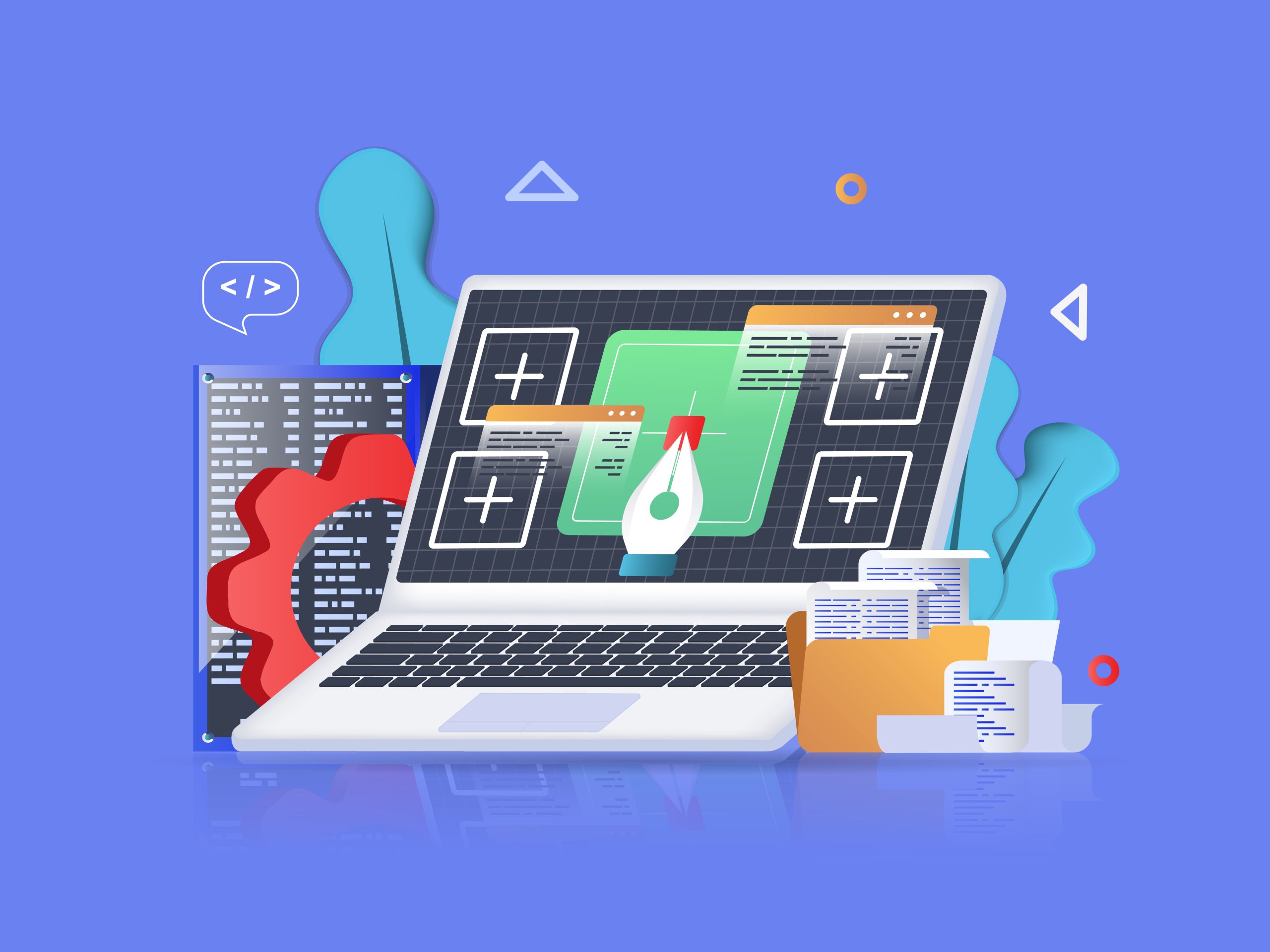How to Become a Web Developer
 Justin Young
Justin Young
- APIs
- Back-end development
- building portfolio websites
- coding languages
- CSS
- databases
- demand for web developers
- freelance web projects
- front-end development
- HTML
- JavaScript frameworks
- learning coding languages
- NoSQL
- programming fundamentals
- programming skills
- responsive design
- server-side technologies
- SQL
- web developer
- web development career
- web development industry
- Web development projects

How to Become a Web Developer Introduction: Understanding the Role of a Web Developer and Why it is in High Demand
web developer, web development career, demand for web developers, web development industry
How to Become a Web Developer: The role of a web developer is becoming increasingly significant and highly sought-after. With the rapid growth of the internet and the continuous evolution of technology, websites have become crucial for businesses and individuals to establish their online presence. As a result, the demand for skilled web developers has skyrocketed.
A web developer's responsibility is to create and maintain visually appealing, user-friendly, and functional websites. They possess a unique skill set that blends technical knowledge with creativity and problem-solving abilities. From coding to designing layouts and optimizing performance, web developers play a crucial role in shaping the online landscape.
The web development industry offers many exciting opportunities for those pursuing a career in this field. With advancements in e-commerce, mobile applications, and interactive user experiences, there is no shortage of projects requiring skilled developers' expertise.
Moreover, businesses recognize the importance of establishing an effective online presence to reach their target audience, and the demand for talented web developers is growing exponentially. Companies across various industries constantly seek professionals who can design innovative websites that capture attention and drive business growth.
Understanding the role of a web developer is crucial in recognizing why it is currently in such high demand. The ever-expanding digital landscape calls for skilled individuals who can create visually appealing websites with seamless functionality. As technology continues to advance rapidly, it is evident that this career path offers immense potential for growth and success.
Step 1: Develop a Strong Foundation in Programming and Coding Skills
programming skills, coding languages, learning coding languages, programming fundamentals
Whether you aspire to become a software developer, web designer, or data analyst, understanding programming languages and coding fundamentals is crucial for success in these fields.
The first step in this journey is to develop a solid understanding of programming fundamentals. This includes grasping concepts such as variables, loops, conditional statements, and functions. These building blocks form the backbone of any coding language and provide the necessary tools to solve complex problems.
Next, it's essential to choose a programming language to focus on. There are numerous options available, each with its strengths and applications. Popular choices include Python, Java, C++, and JavaScript. Researching these languages and their practical uses can help determine which aligns best with your career goals.
Once you have selected a coding language, various resources are available to help you acquire these skills. Online tutorials, coding boot camps, and community forums offer valuable learning opportunities for beginners. Practicing exercises and projects allow you to apply your knowledge in real-world scenarios.
Investing time and effort into developing your programming skills and understanding coding languages' intricacies will give you a solid foundation to propel your career forward in the ever-evolving tech industry.
Step 2: Building a Solid Understanding of Front-End Development Technologies and Tools
front-end development, HTML, CSS, JavaScript frameworks, responsive design
Becoming a proficient front-end developer requires a strong foundation in this field's various technologies and tools. Step 2 of this process is all about building that foundation.
At the core of front-end development are three languages: HTML, CSS, and JavaScript. HTML is responsible for structuring webpage content, while CSS controls the presentation and layout. JavaScript adds interactivity and dynamic functionality.
It's also important to familiarize yourself with popular JavaScript frameworks like React.js, Angular.js, or Vue.js. These frameworks provide powerful tools and libraries that streamline development and enhance user experience.
Responsive design principles are also crucial in today's mobile-first world. Responsive design ensures that websites adapt seamlessly to different screen sizes and devices, using media queries and flexible grid systems to create fluid layouts that look great on desktops, tablets, and mobile devices.
You can create visually appealing websites with interactive features that engage users across various platforms by building a solid understanding of these front-end development technologies and tools.
Step 3: Mastering Back-End Development Principles and Server-Side Technologies
Back-end development, server-side technologies, databases (SQL/NoSQL), APIs
To become a proficient back-end developer, it is crucial to master the principles of back-end development, and familiarizing yourself with various server-side technologies is vital. This step will equip you with the necessary skills to handle databases, work with APIs, and ensure seamless communication between the front-end and back-end of web applications.
One of the critical aspects of back-end development is understanding databases. This includes SQL (Structured Query Language) and NoSQL (non-relational) databases. SQL databases are widely used for their ability to store structured data in tables, while NoSQL databases offer flexibility in handling unstructured data. Mastering these database technologies will enable you to manage data storage and retrieval for your web applications efficiently.
Additionally, gaining expertise in working with Application Programming Interfaces (APIs) is essential for back-end developers. APIs serve as intermediaries that allow different software systems to communicate and exchange data seamlessly. Understanding how to integrate APIs into your web applications will enable you to leverage external services, access third-party data, and enhance functionality.
Mastering these back-end development principles and server-side technologies will give you a solid foundation for building robust and scalable web applications. The knowledge gained in this step will empower you to design efficient database structures, implement secure data handling practices, and seamlessly integrate external services through APIs.
Step 4: Gaining Hands-On Experience with Web Development Projects and Building a portfolio
Web development projects, building portfolio websites, freelance web projects
Step 4: Gain Hands-On Experience with Web Development Projects and Build a Portfolio
In the field of web development, practical experience is invaluable. Building a portfolio of real-world projects showcases your skills and allows you to apply what you've learned tangibly.
One of the best ways to gain hands-on experience is by working on web development projects, ranging from personal websites to freelance assignments. Engaging in these projects helps you hone your technical skills, problem-solving abilities, and project management capabilities.
Building portfolio websites is essential to establish yourself as a competent web developer. These websites serve as a showcase for potential clients or employers to see your capabilities firsthand. They allow you to demonstrate proficiency in various programming languages, frameworks, and design principles.
Freelance web projects offer an excellent opportunity to work with real clients and build professional relationships. Taking on freelance assignments allows you to tackle diverse challenges and adapt to different client requirements. It also helps refine your communication and negotiation skills while honing your technical expertise.
By gaining hands-on experience through web development projects and building a compelling portfolio, you position yourself as a skilled professional ready to take on new opportunities in web development.
Step 5: Continuous Learning and Staying Updated with Evolving Web Technologies
Ongoing learning in web development, staying updated with the latest trends and technologies in web development.
In today's fast-paced world of web development, staying updated with evolving technologies and continuous learning is crucial to achieving success. As technology advances and new trends emerge, web developers must keep their skills sharp and adapt to the changing landscape. Ongoing learning in the web development field is about acquiring new knowledge and staying ahead of the competition. Developers can ensure they have the latest tools and techniques to create cutting-edge websites and applications by continuously expanding their skills.
Keeping up with the latest trends and technologies in web development allows developers to meet the ever-growing demands of clients and users. It enables them to leverage new features, frameworks, and languages that enhance user experience, improve performance, and streamline development processes. Moreover, continuous learning fosters innovation and creativity within the web development community. It encourages developers to think outside the box, experiment with new ideas, and push boundaries. By embracing ongoing learning, developers can stay at the forefront of industry advancements and contribute to shaping the future of web development.
To stay updated with evolving web technologies, developers can engage in various activities such as attending industry conferences, participating in online courses or workshops, joining developer communities or forums, and following influential blogs or podcasts focused on web development trends. Exploring real-world projects or collaborating with other professionals can also provide valuable hands-on experience that keeps their skills relevant.
In conclusion, continuous learning is an essential part of a successful career in web development. Developers can remain competitive and drive innovation forward by actively seeking opportunities to stay updated with evolving technologies and trends in this ever-changing field.
Conclusion: Embarking on Your Journey as a Successful Web Developer
Career prospects as a web developer. Continuous self-improvement within the field of web development.
It's important to note that web development offers a promising career path for those willing to take on this exciting journey. As technology advances and businesses heavily rely on their online presence, the demand for skilled web developers is only expected to increase.
However, it's crucial to understand that success in this field requires continuous self-improvement. The world of web development is constantly evolving, with new frameworks, languages, and tools emerging regularly. Investing time and effort is necessary to stay updated with the latest industry trends and continuously enhance your skills.
Expanding your knowledge and staying ahead of the curve can position you as a valuable asset in the competitive job market. Whether learning new programming languages or mastering cutting-edge technologies, continuous self-improvement will allow you to adapt to changing demands and excel in your career as a web developer.
Therefore, don't hesitate to take risks, explore new opportunities, and never stop learning. With dedication and a passion for innovation, you can carve out a successful path as a web developer and unlock endless possibilities in this dynamic industry.
Related Posts
 How Often Should You Do Website Maintenance?
How Often Should You Do Website Maintenance?
The Importance of Regular Website Maintenance Website maintenance, website upkeep, website management, website performance Managing a website involves multiple tasks, including updating content, design elements, and functionality. To prevent potential vulnerabilities, it’s crucial to keep your site up-to-date with the latest technologies, security patches, and bug fixes. Monitoring critical website performance metrics includes page load […]
 The Importance of Website Maintenance in 2024 and Why Businesses Need It For Long-Term Success: Ensuring Optimal Performance and User Experience
The Importance of Website Maintenance in 2024 and Why Businesses Need It For Long-Term Success: Ensuring Optimal Performance and User Experience
Understanding the Significance of Website Maintenance Website maintenance, website management, website performance, user experience Maintaining a website requires consistent monitoring, updating, and troubleshooting to ensure optimal performance. This involves conducting routine checks for broken links, optimizing loading speed, fixing bugs or errors, and ensuring compatibility across various devices and browsers. The significance of website maintenance […]
 Best Website Maintenance Tools for your Business in 2024
Best Website Maintenance Tools for your Business in 2024
Discover the best website maintenance tools to keep your online presence running smoothly this year website maintenance, website management, website performance, website upkeep Best Website Maintenance Tools for your website is crucial to ensure a positive user experience. A well-maintained website enables visitors to navigate quickly, find relevant information, and interact positively with your brand. […]
 How Much Does Website Maintenance Cost?
How Much Does Website Maintenance Cost?
Know website maintenance costs upfront to avoid surprises and keep your website running smoothly.
Did you know that users take only 50 milliseconds (0.05 seconds!) to form an opinion about your website? Within this short period, they decide whether or not they want to stay. Keeping your website up-to-date is a critical way to show its quality.
The Cost of maintaining a website pays off in the end because 47% of customers will visit a company’s website before deciding whether or not to make a purchase. Therefore, it is essential to ensure everything looks fresh and runs smoothly!
 10 Essential Questions to Ask When Choosing the Best Web Hosting Services
10 Essential Questions to Ask When Choosing the Best Web Hosting Services
When selecting the optimal web hosting services, asking these ten essential questions is crucial. web hosting services, importance of web hosting, choosing the right web hosting provider, website performance Choosing the right web hosting provider is crucial for ensuring that your website is accessible to users at all times. They provide the necessary infrastructure and […]